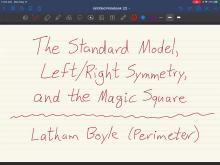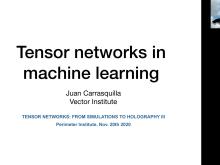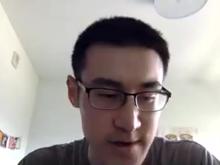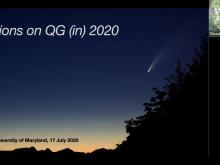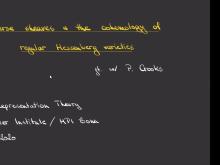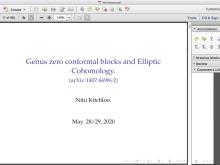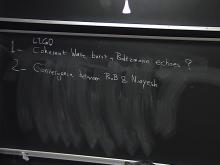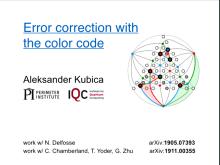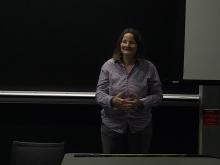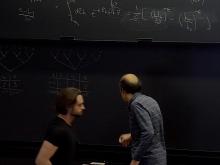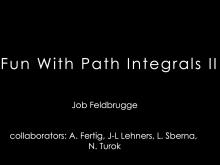Format results
-
16 talks-Collection NumberC21001
Talk
-

Welcome and Opening Remarks
Kirill Krasnov University of Nottingham
-

Finite quantum geometry, octonions and the theory of fundamental particles.
Michel Dubois-Violette University of Paris-Saclay
-

Supersymmetry and RCHO revisited
Paul Townsend University of Cambridge
-

Spin (8,9,10), Octonions and the Standard Model
Kirill Krasnov University of Nottingham
-

Gravity as the square of gauge theory
Leron Borsten Heriot-Watt University
-

A Magic Pyramid of Supergravity Theories from Yang-Mills Squared
Mia Hughes Imperial College London
-

Division algebraic symmetry breaking
-
Cohl Furey Humboldt University of Berlin
-
Mia Hughes Imperial College London
-
-

Clifford algebra of the Standard Model
Ivan Todorov Bulgarian Academy of Sciences
-
-
Tensor Networks: from Simulations to Holography III
21 talks-Collection NumberC20034Talk
-

Tensor networks for LGT: beyond 1D
Mari-Carmen Banuls Max Planck Institute for Gravitational Physics - Albert Einstein Institute (AEI)
-

Tensor networks for critical systems
Frank Verstraete Ghent University
-

Tensor network models of AdS/qCFT
Jens Eisert Freie Universität Berlin
-

-

Quantum Cellular Automata, Tensor Networks, and Area Laws
Ignacio Cirac Max Planck Institute for Gravitational Physics - Albert Einstein Institute (AEI)
-

Fun with replicas and holographic tensor networks
Michael Walter University of Amsterdam
-

A tensor-network approach to fixed-point models of topological phases
Andreas Bauer Freie Universität Berlin
-

Custom Fermionic Codes for Quantum Simulation
Riley Chien Dartmouth College
-
-
Online School on Ultra Quantum Matter
20 talks-Collection NumberC20032Talk
-

Welcome and Opening Remarks
Michael Hermele University of Colorado Boulder
-

Quantum Phases of Matter and Entanglement Basics
John McGreevy University of California, San Diego
-

Seminar: Engineering quantum spin models with atoms and light
Monika Schleier-Smith Stanford University
-

SYK criticality and correlated metals
Subir Sachdev Harvard University
-

-

-

Seminar: Quantum matter in Moire materials
Pablo Jarillo-Herrero Massachusetts Institute of Technology (MIT) - Center for Extreme Quantum Information Theory (xQIT)
-

Exactly Solvable Topological and Fracton Models as Gauge Theories 1
Xie Chen California Institute of Technology
-
-
Quantum Gravity 2020
22 talks-Collection NumberC20031Talk
-

Welcome and Opening Remarks
Bianca Dittrich Perimeter Institute for Theoretical Physics
-

Approaches to Quantum Gravity: Key Achievements and Open Issues
Hermann Nicolai Max-Planck-Institut für Gravitationsphysik
-

Quantum gravity from the loop perspective
Alejandro Perez Aix-Marseille University
-

Lessons for quantum gravity from quantum information theory
Daniel Harlow Massachusetts Institute of Technology (MIT)
-

Understanding of QG from string theory
Herman Verlinde Princeton University
-

Progress in horizon thermodynamics
Aron Wall University of Cambridge
-

Asymptotically Safe Amplitudes from the Quantum Effective Action
Frank Saueressig Radboud Universiteit Nijmegen
-

The Remarkable Roundness of the Quantum Universe
Renate Loll Radboud Universiteit Nijmegen
-
-
Geometric Representation Theory
24 talks-Collection NumberC20030Talk
-

-

Singularities of Schubert varieties within a right cell
Martina Lanini University of Rome Tor Vergata
-

Yangians and cohomological Hall algebras of Higgs sheaves on curves
Olivier Schiffmann University of Paris-Saclay
-

Tate's thesis in the de Rham setting
Sam Raskin The University of Texas at Austin
-

Fundamental local equivalences in quantum geometric Langlands
Gurbir Dhillon Stanford University
-

Z-algebras from Coulomb branches
Oscar Kivinen California Institute of Technology
-

Cotangent complexes of moduli spaces and Ginzburg dg algebras
Sarah Scherotzke University of Luxembourg
-

-
-
Elliptic Cohomology and Physics
11 talks-Collection NumberC20029Talk
-

Projective elliptic genera and applications
Fei Han National University of Singapore
-

Topological Modular Forms and Quantum Field Theory
Davide Gaiotto Perimeter Institute for Theoretical Physics
-

Equivariant elliptic cohomology with integral coefficients
Lennart Meier Utrecht University
-

The de Rham model for elliptic cohomology from physics
Arnav Tripathy Harvard University
-

Quasisymmetric characteristic numbers for Hamiltonian toric manifolds
Jack Morava Johns Hopkins University
-

Codes, vertex algebras and topological modular forms
Gerd Laures Ruhr University Bochum
-

-

Elliptic characteristic classes, bow varieties, 3d mirror duality
Richard Rimanyi University of North Carolina at Chapel Hill
-
-
Echoes in Southern Ontario
11 talks-Collection NumberC20018Talk
-

-

-

-

Echoes and Holography
Krishan Saraswat University of California, Santa Barbara
-

-

-

-

-
-
Indefinite Causal Structure
26 talks-Collection NumberC19049Talk
-

-

10 years of the quantum SWITCH: state of the art and new perspectives
Giulio Chiribella University of Hong Kong (HKU)
-

Cyclic quantum causal models and violations of causal inequalities
Ognyan Oreshkov Université Libre de Bruxelles
-

TBA
Laura Henderson University of Waterloo
-

Composing causal orderings
Aleks Kissinger University of Oxford
-

Quantum principle of relativity
Andrzej Dragan University of Warsaw
-

-

What happens when we quantize time?
Alexander Smith Saint Anselm College
-
-
Symmetry, Phases of Matter, and Resources in Quantum Computing
16 talks-Collection NumberC19048Talk
-

Symmetry, topology, and thermal stability
Stephen Bartlett University of Sydney
-

Symmetry-protected topologically ordered phases for measurement-based quantum computation
Akimasa Miyake University of New Mexico
-

A resource theory of nonclassicality in Bell scenarios
Robert Spekkens Perimeter Institute for Theoretical Physics
-

Variational Quantum Eigensolvers and contextuality
Peter Love Tufts University
-

Magic resource theories and classical simulation
Earl Campbell University of Sheffield
-

Classical algorithms for quantum mean values
David Gosset Institute for Quantum Computing (IQC)
-

Fine-grained quantum supremacy and stabilizer rank
Tomoyuki Morimae Kyoto University
-

Towards local testability for quantum coding
Anthony Leverrier Inria Paris Centre
-
-
Emmy Noether Workshop: The Structure of Quantum Space Time
25 talks-Collection NumberC19047Talk
-

Welcome and Opening Remarks
Bianca Dittrich Perimeter Institute for Theoretical Physics
-

Quantum Spacetime from Lattice Gravity à la CDT
Renate Loll Radboud Universiteit Nijmegen
-

How complement maps can cure divergences
Sylvie Paycha University of Potsdam
-

The gravitational Wilson loop and the non-Abelian Stokes' theorem
Reiko Toriumi Okinawa Institute of Science and Technology Graduate University
-

The dynamics of difference
Lee Smolin Perimeter Institute for Theoretical Physics
-

-

Probing fundamental physics with gravitational waves
Cecilia Chirenti Universidade Federal do ABC
-

Implications of the Quantum Nature Space-time for the Big Bang and Black Holes
Abhay Ashtekar Pennsylvania State University
-
-
Everpresent Lambda: Theory Meets Observations
15 talks-Collection NumberC19046Talk
-

-

Introduction to Everpresent Lambda
Rafael Sorkin Perimeter Institute for Theoretical Physics
-

Status of Hubble tension in Cosmology
Niayesh Afshordi University of Waterloo
-

Causal Set Action/Entropy
Yasaman Kouchekzadeh Yazdi Dublin Institute For Advanced Studies
-

Observational constraints on modified gravity and dark energy
Jian Li Simon Fraser University (SFU)
-

Supplementary considerations on Everpresent Lambda
Rafael Sorkin Perimeter Institute for Theoretical Physics
-

-

Implementing a stochastic dark energy framework into CAMB
Levon Pogosian Simon Fraser University (SFU)
-
-
Simplicity III
17 talks-Collection NumberC19044Talk
-

On the possible role of nilpotent internal symmetries in unification
Andras Laszlo Wigner Research Centre for Physics
-

Rethinking the origin of neutrino masses: the role of gravity
Lena Funcke University of Bonn
-

Swampland Constraints on Neutrino Masses and Dark Energy
Irene Valenzuela European Organization for Nuclear Research (CERN)
-

-

Exceptional Quantum Algebra for the Standard Model of Particle Physics
Ivan Todorov Bulgarian Academy of Sciences
-

SO(7,7) Structure of Standard Model Fermions
Kirill Krasnov University of Nottingham
-

The Standard Model from A Jordan Algebra
Latham Boyle University of Edinburgh
-

Particle Theory from Jordan Geometry
Shane Farnsworth University of Regensburg
-
-
Octonions and the Standard Model
16 talks-Collection NumberC21001Over the years, various researchers have suggested connections between the octonions and the standard model of particle physics. The past few years, in particular, have been marked by an upsurge of activity on this subject, stimulated by the recent observation that the standard model gauge group and fermion representation can be elegantly characterized in terms of the octonions. This workshop, which will be the first ever on this topic, is intended to bring this new community together in an attempt to better understand these ideas, establish a common language, and stimulate further progress.
The workshop will consist of an hour-long talk every Monday at noon (EST), with the first talk on Monday February 8, and the final talk on Monday May 17.
-
Tensor Networks: from Simulations to Holography III
21 talks-Collection NumberC20034 -
Online School on Ultra Quantum Matter
20 talks-Collection NumberC20032 -
Quantum Gravity 2020
22 talks-Collection NumberC20031 -
Geometric Representation Theory
24 talks-Collection NumberC20030 -
Elliptic Cohomology and Physics
11 talks-Collection NumberC20029 -
-
Indefinite Causal Structure
26 talks-Collection NumberC19049There has been a surge of interest in indefinite causal structure the idea that cause and effect can no longer be sharply distinguished. Motivated both by experimentation with quantum switches and quantum gravity there can be situations in which there is no matter-of-the-fact as to what the causal structure of spacetime is. This meeting will bring together workers in Quantum Foundations and Quantum Gravity in both theoretical experimental physics to discuss the state of the art of current research and set new directions for this emerging subdiscipline.
-
Symmetry, Phases of Matter, and Resources in Quantum Computing
16 talks-Collection NumberC19048Our conference covers three related subjects: quantum fault-tolerance magic states and resource theories and quantum computational phases of matter. The linking elements between them are (a) on the phenomenological side the persistence of computational power under perturbations and (b) on the theory side symmetry. The latter is necessary for the working of all three. The subjects are close but not identical and we expect cross-fertilization between them.Fault tolerance is an essential component of universal scalable quantum computing.However known practical methods of achieving fault tolerance are extremely resource intensive. Distillation of magic states is in the current paradigm of fault-tolerance the costliest operational component by a large margin. It is therefore pertinent to improve the efficiency of such procedures study theoretical limits of efficiency and more generally to establish a resource theory of quantum state magic. During the workshop we will focus on a fundamental connection between fault-tolerant protocols and symmetries.``Computational phases of matters are a surprising link between quantum computation and condensed matter physics. Namely in the presence of suitable symmetries the ground states of spin Hamiltonians have computational power within the scheme of measurement-based quantum computation and this power is uniform across physical phases. Several computationally universal phases have to date been discovered. This subject is distinct from the above but linked to them by the feature of persistence of computational power under deformations and deviations.
-
Emmy Noether Workshop: The Structure of Quantum Space Time
25 talks-Collection NumberC19047Understanding the small-scale structure of spacetime is one of the biggest challenges faced by modern theoretical physics. There are many different attempts to solve this problem and they reflect the diversity of approaches to quantum gravity. This workshop will bring together researchers from a wide range of quantum gravity approaches and give them an opportunity to exchange ideas and gain new insights.
-
Everpresent Lambda: Theory Meets Observations
15 talks-Collection NumberC19046One of the biggest mysteries in cosmology and fundamental physics is the nature of dark energy that is responsible for the current acceleration of cosmic expansion. While a cosmological constant provides the simplest model of dark energy recent observational tensions amongst supernovae Ia gravitational lensing time delays and cosmic microwave background suggest the need for a more complex dynamical dark energy. One of the oldest proposals for a dynamical dark energy is Everpresent Lambda proposed by Sorkin which is inspired by the causal set model of quantum gravity. It was recently shown that this model can potentially resolve the tensions in cosmological observations. The meeting aims to bring together a small number of experts in quantum gravity causal sets and cosmology to carefully examine the models theoretical predictions and its observational tests and pave the way for what might be an(other) exciting insight from cosmology into the fundamental nature of spacetime.
-
Simplicity III
17 talks-Collection NumberC19044This cross-disciplinary workshop gathers theorists who have been working on novel approaches to understanding the structure of the Standard Model and its link to cosmology and gravity. It follows the previous Simplicity I and II workshops at Princeton University (2014) and Fermilab (2016) and will be a small informal meeting with plenty of room for discussions.
